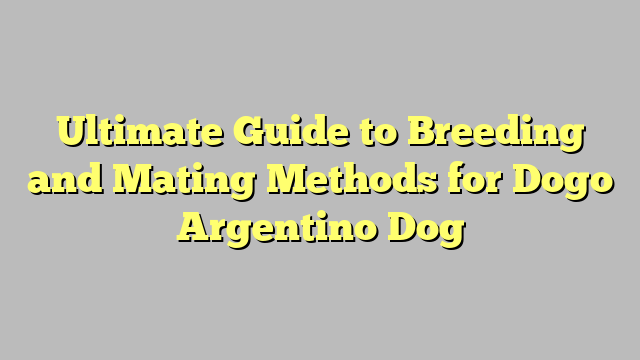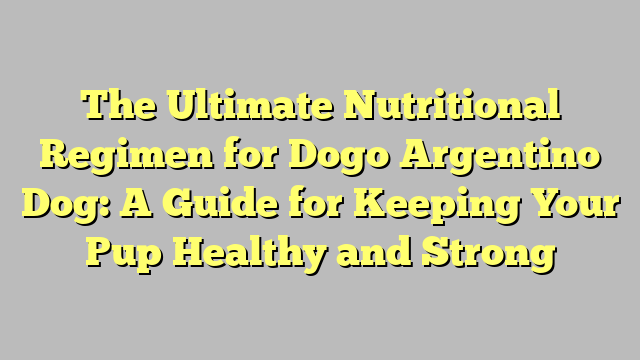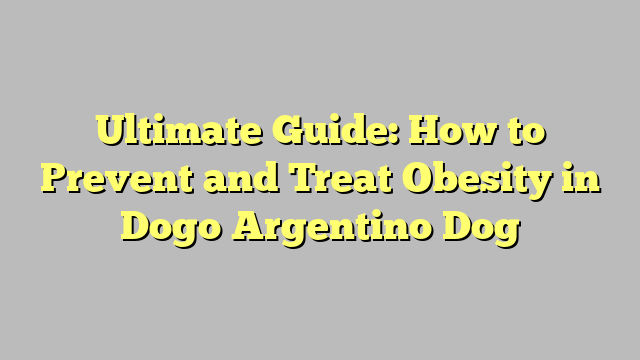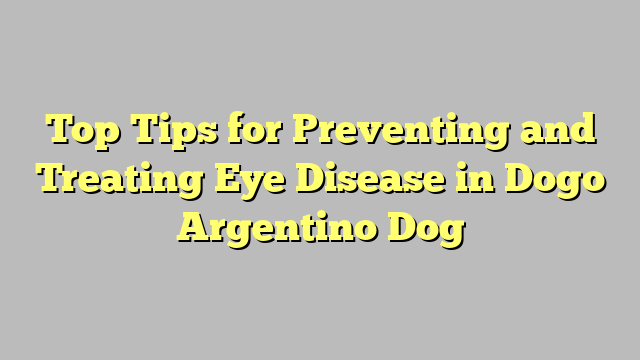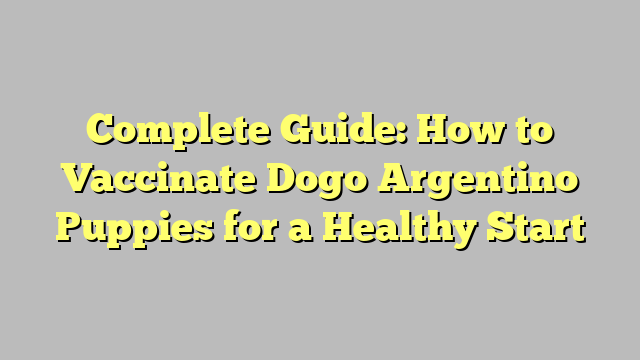
Complete Guide: How to Vaccinate Dogo Argentino Puppies for a Healthy Start
Discover the essential steps for vaccinating your Dogo Argentino puppies for a healthy beginning.
Introduction to Dogo Argentino puppies
The Dogo Argentino is a large and powerful breed of dog that is known for its protective and loyal nature. These puppies are born with a strong instinct to guard and protect, making them excellent watchdogs and guardians for their families. They are also known for their intelligence and independence, which can make them a bit challenging to train for inexperienced dog owners.
Characteristics of Dogo Argentino puppies
– Dogo Argentino puppies are known for their large size, with males reaching up to 32 inches in height and weighing between 90-130 pounds.
– They have a thick, double coat that can come in white or white with biscuit-colored markings.
– Dogo Argentino puppies are known for their calm and gentle demeanor, but they can be wary of strangers and have a strong protective instinct.
Training and socialization for Dogo Argentino puppies
– Early socialization and training are crucial for Dogo Argentino puppies to ensure that they grow up to be well-behaved and well-adjusted adults.
– They require firm and consistent training, as they can be independent and stubborn at times.
– Positive reinforcement methods, such as treats and praise, work best for training Dogo Argentino puppies.
Health and care for Dogo Argentino puppies
– Dogo Argentino puppies require regular exercise to keep them physically and mentally stimulated.
– Their thick coat requires regular grooming to prevent matting and tangles.
– Like all breeds, Dogo Argentino puppies should receive regular veterinary check-ups and vaccinations to ensure their health and well-being.
Understanding the vaccination schedule
When it comes to the vaccination schedule for your puppy, it’s important to understand that there is not a one-size-fits-all approach. Factors such as your location, your dog’s individual risk factors, and your veterinarian’s recommendations will all play a role in determining which vaccinations your puppy needs and when they should receive them.
Core Vaccines
The core vaccines, which are considered essential for all dogs, include the DHLPP (distemper, hepatitis, leptospirosis, parvo, and parainfluenza) series. These vaccines are typically administered in a series of three doses at 6, 12, and 16 weeks of age. It’s important to follow this schedule to ensure that your puppy is protected against these diseases.
Rabies Vaccination
In addition to the core vaccines, your puppy will also need a rabies vaccination, which is usually given around 16 weeks of age. Rabies vaccinations are not only necessary for your dog’s health, but they are also required by law in most states.
Cost Considerations
The cost of puppy vaccinations can vary depending on where you live and the specific vaccines your puppy needs. On average, the core vaccines can cost around $75-100, while the rabies vaccination may be an additional $15-20. Some low-cost clinics or animal shelters may offer discounted or even free vaccinations, so it’s worth exploring these options to help manage the cost.
It’s important to discuss the vaccination schedule and cost considerations with your veterinarian to ensure that your puppy receives the necessary vaccinations to protect their health.
Preparing for vaccination
Before taking your puppy for vaccinations, it’s important to prepare them for the experience. Here are a few tips to help make the process as smooth as possible:
1. Schedule a vet visit
Before the vaccination appointment, schedule a visit with your vet to discuss the vaccination schedule and any concerns you may have. This is also a good time to ask any questions about the vaccinations and their potential side effects.
2. Keep your puppy calm
On the day of the vaccination, try to keep your puppy calm and relaxed. This can help reduce stress and anxiety during the visit. Consider bringing along their favorite toy or blanket for comfort.
3. Bring necessary documents
Make sure to bring any necessary documents, such as your puppy’s health records, to the vaccination appointment. This will help the vet understand your puppy’s medical history and provide the best care possible.
4. Monitor for side effects
After the vaccination, monitor your puppy for any potential side effects, such as swelling at the injection site or changes in behavior. If you notice any concerning symptoms, contact your vet immediately.
By preparing for the vaccination appointment, you can help ensure that your puppy receives the necessary care and protection against preventable diseases.
Vaccination process
The vaccination process for puppies typically begins at around 6 weeks of age and continues throughout their first year. Puppies will receive a series of vaccinations, including the core vaccines for distemper, hepatitis, leptospirosis, parvo, and parainfluenza. These vaccines are usually administered in a series of three doses at 6, 12, and 16 weeks of age to ensure full protection.
Core Vaccines
– Distemper
– Hepatitis
– Leptospirosis
– Parvo
– Parainfluenza
Rabies Vaccination
In addition to the core vaccines, puppies will also receive a rabies vaccination, typically around 12-16 weeks of age. This vaccination is essential and may be required by law in many areas.
Cost
The cost of puppy vaccinations can vary depending on factors such as location and the specific vaccines required. On average, the core vaccines may cost around $75-100, while the rabies vaccination can range from $15-20. Some animal shelters may offer lower-cost or free vaccinations for adopted pets.
It’s important to discuss the vaccination schedule and costs with your veterinarian to ensure that your puppy receives the necessary protection against preventable diseases.
Common concerns and myths about puppy vaccinations
Myth: Puppy vaccinations can cause autism in dogs
There is no scientific evidence to support the claim that vaccinations can cause autism in dogs. This myth likely stems from the controversy surrounding vaccinations and autism in humans, but it does not apply to dogs. Vaccinations are crucial for protecting your puppy from potentially deadly diseases.
Concern: Vaccinations can overwhelm a puppy’s immune system
While it is important to be mindful of a puppy’s immune system, vaccinations are designed to stimulate the immune system to produce antibodies that protect against specific diseases. The vaccines are carefully formulated to provide protection without overwhelming the immune system. Your veterinarian can provide guidance on the appropriate vaccination schedule for your puppy.
Myth: Natural immunity from the mother is sufficient for protecting puppies
While puppies do receive some immunity from their mother’s milk, this protection is temporary and may not cover all potential diseases. Vaccinations are necessary to ensure long-term immunity and protection from a range of illnesses that can be life-threatening for puppies.
Concern: Vaccinations can cause adverse reactions in puppies
While it is true that some puppies may experience mild reactions to vaccinations, such as temporary discomfort or swelling at the injection site, serious adverse reactions are rare. The benefits of vaccination in preventing serious diseases far outweigh the potential risks.
Myth: Indoor dogs do not need vaccinations
Even if your puppy spends most of their time indoors, they can still be at risk of exposure to certain diseases. Additionally, if you ever need to board your puppy, use dog daycare services, or take them to training classes, vaccinations may be required. It is important to discuss your puppy’s lifestyle and potential exposure with your veterinarian to determine the necessary vaccinations.
It is important to consult with a reputable veterinarian for accurate information and guidance on puppy vaccinations. Always discuss any concerns or myths you may have about vaccinations with a qualified professional.
Post-vaccination care
After your puppy receives their vaccinations, it’s important to monitor them for any adverse reactions. Some puppies may experience mild symptoms such as soreness at the injection site, slight fever, or decreased appetite. These symptoms should resolve within a day or two. However, if your puppy experiences more severe symptoms such as vomiting, diarrhea, difficulty breathing, or swelling at the injection site, it’s important to contact your veterinarian immediately.
Post-vaccination care checklist:
– Monitor your puppy for any adverse reactions
– Provide a comfortable and quiet space for your puppy to rest
– Ensure your puppy stays hydrated
– Avoid strenuous exercise for at least 24 hours
– Follow up with your veterinarian if you have any concerns or questions
It’s also important to keep your puppy away from other dogs and public areas for a few days after vaccination to minimize the risk of exposure to infectious diseases. Following these post-vaccination care guidelines will help ensure your puppy stays healthy and happy after receiving their vaccinations.
Additional tips for a healthy start
When bringing a new puppy into your home, it’s important to provide a healthy and safe environment for them to thrive. Here are some additional tips for a healthy start:
Proper Nutrition
Ensure your puppy is getting the best puppy food that is appropriate for their age and size. Consult with your veterinarian to determine the right diet for your puppy’s specific needs.
Regular Exercise
Puppies have a lot of energy and need regular exercise to stay healthy and happy. Take your puppy for walks, play games, and provide them with plenty of opportunities to stay active.
Socialization
Expose your puppy to different environments, people, and other animals to help them develop good social skills. Proper socialization is important for a well-adjusted adult dog.
Training and Mental Stimulation
Start training your puppy early and provide them with mental stimulation through interactive toys and games. This will help keep their minds sharp and prevent boredom.
Regular Veterinary Check-ups
In addition to vaccinations, regular veterinary check-ups are important for monitoring your puppy’s overall health and addressing any concerns that may arise.
By following these tips, you can ensure that your new puppy gets off to a healthy start and grows into a happy and well-adjusted adult dog.
Vaccinating Dogo Argentino puppies is important for their health and well-being. Consult with a veterinarian to create a vaccination schedule and ensure that your puppies are protected against common diseases. Follow their guidelines and advice for a healthy and happy Dogo Argentino puppy.

